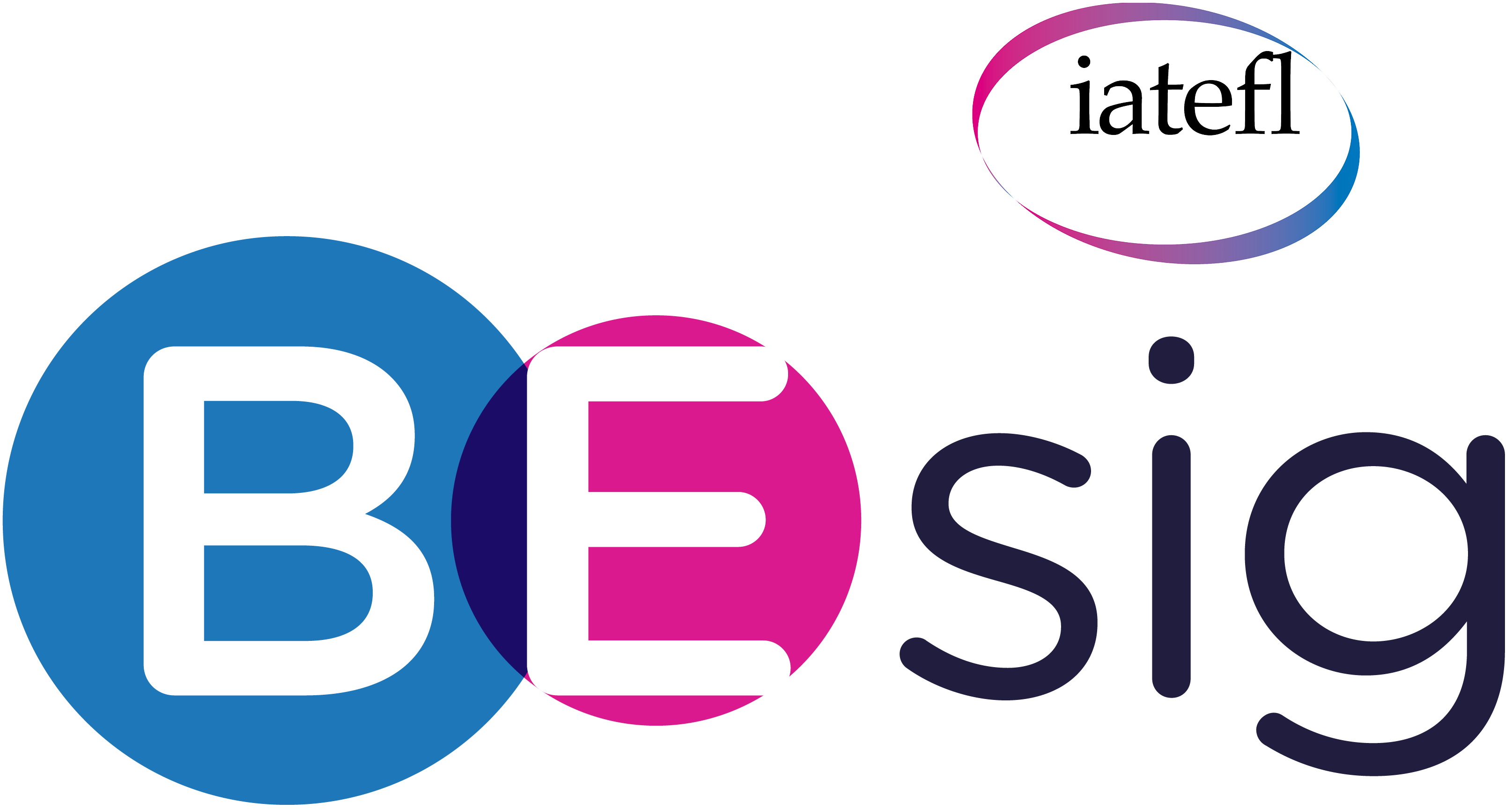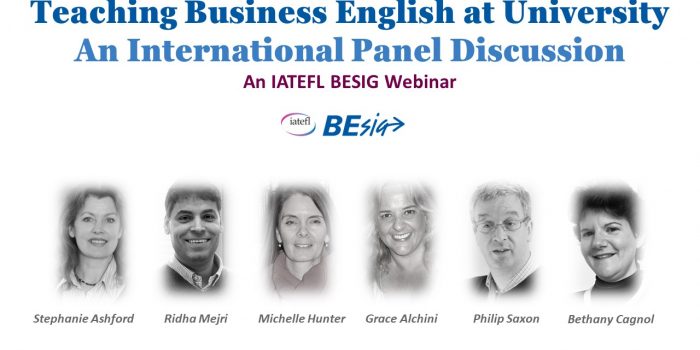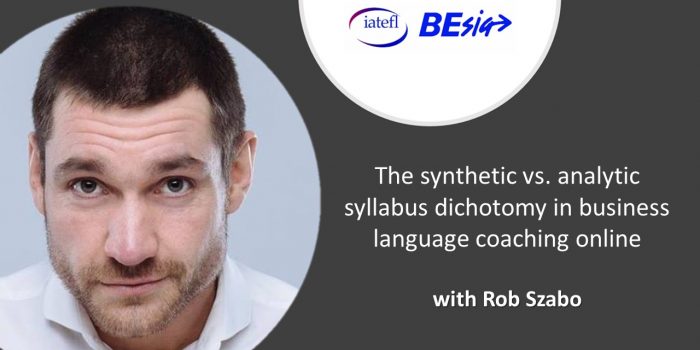
Jasmina Sazdovska
Welcome back to this week’s interview. We hope you are keeping safe and well, and are enjoying getting to know more and more BESIG members. Remember, if you’d like to be featured in the Meet a Member series, just get in touch! I’d love to hear from you! This week, we’re meeting Jasmina, a woman who wears many business English hats. Based in Budapest, she lecturers and trains and does research in the field of business English. Read on to find out more.
Bio: Jasmina Sazdovska is a college professor and visiting lecturer at Eötvös Loránd University (ELTE) in Budapest. She has a PhD in Language Pedagogy dealing with accomplishing intentions in business presentations. Her research and teaching interests include presentations, meetings, negotiations, Business English, non-native teachers, teaching methodologies, creative language and humour. https://jasminasazdovska.weebly.com/
Tell us about a particularly memorable BESIG moment.
I loved the online Summer Symposium idea when we started in Japan early morning, went through the whole of Europe and ended up in South America late in the evening. It was such a fantastic event where you got an opportunity to participate in talks from all over the globe and meet people from diverse backgrounds. Meeting interesting colleagues is one of the best things about BESIG. For example, Andrea Vogt-Nas, a colleague from ELTAS, attended one of my BESIG presentations and then invited me to do an elevator pitch training in Stuttgart. It was a unique opportunity and BESIG provides the perfect platform for this type of networking. Along with attending exciting talks and workshops, we get to exchange ideas and make new friends with similar interests.
How is teaching pre-service students different from teaching in-company in your context?
With pre-service students you need to provide extensive context, while with in-company training you need to focus on details. In presentations, for instance, business students lack the experience to be able to make informed decisions about the choices of structure and style. So, you need to provide them with background facts like where the presentation might be taking place, what the main purpose of the talk is and how they’ll be able to measure their success. For these students, you need to be prepared for a wide range of situations. In-service professionals are already familiar with their situation and they need assistance with existing specific tasks. They might say: I’ve got a presentation next week, can we run through it together to iron out the details? In these cases, you need to be very well informed about the client’s situation.
What do your university students go on to use their English for?
Several years ago, I participated in a research study based on an employer satisfaction survey. We asked employers of a business school’s graduates and interns about the skills needed in the workplace. Surprisingly, translation was very high on the list, even though it’s not very popular in the language classroom. Other skills that employers mentioned coincide closely with the 4 Cs of 21st Century Skills: creativity, collaboration, communication and critical thinking. Being able to work in diverse teams and tactfully handle cross-cultural communication is a priority for employers. To be able to meet these needs, we need to pay more attention to building sensitivity to the register and formality. In terms of writing, graduates are frequently required to summarise longer texts like reports or news stories as well as draft and edit postings for the organisation’s website or social media.
How do you deal with students who lack motivation?
I personally think that motivation has something in common with COVID-19: it’s infectious! When students are unmotivated and listless, it’s very difficult as a teacher not to give in to the same feelings. Luckily though, it works the other way round, too. When I’m highly motivated and upbeat, I can ‘infect’ the students with my energy. So, with groups or topics that lack a bit of spark, I try hard to find something that’ll excite me and do my best to then spread that excitement to the students. It’s not a fool proof method and it doesn’t always work, but it’s worth a shot! Getting to know the students and developing a rapport with them also helps.
What is the topic of your PhD thesis and why did you choose it?
The title of my dissertation is The Intentionality Model of Presentations: Towards a Speech Act and Genre Analysis of Business Presentations. I analysed the goals of each utterance (speech act) in a business presentation and compared it with the overall communicative aim of the genre to determine how successfully they matched. I created a new categorisation of aims: informative, conveying facts in a neutral manner; organisational, helping the speaker to structure the talk; cooperative, bringing the speaker closer to the audience; and territorial, defending the speaker’s independence. After transcribing a presentation, I divide it into separate utterances, each comprising an individual goal, and then count the frequencies of the four categories. These statistics give an insight into how successfully the overall aim of the talk was achieved and what should be done to improve the presentation.
You can find my thesis on my website: https://jasminasazdovska.weebly.com/uploads/6/9/3/1/69319523/dissertation__draft_3_.pdf
Would you say teaching soft skills is an essential part of teaching business English?
Absolutely! Over 70% of jobs these days are in the service sector where communication is a key element of task completion. The tools of business in the 21st century are no longer those of production, but those of international communication. As the employer satisfaction research I mentioned before proved, we need to train future business professionals to work successfully together in diverse teams, to navigate cross-cultural negotiations, to convey messages across different media platforms and geographic boundaries. Whether you call them interpersonal skills, soft skills or people skills, they are an essential part of the effective manager’s toolkit. The interesting thing about these skills is that you can never really be done with learning. There’s always something new to discover with every new person you meet.
How have you dealt with the transition to teaching and working online?
I’m a people person, so it’s been extremely difficult. I very much hope that the autumn semester can start getting back to business as usual. The switch at my organisation came extremely suddenly and we had no time to prepare. The first week or so was spent with making sure all the technology is up and running and then the following couple of weeks I had to adapt all the materials, which were designed for face-to-face delivery, to online teaching. Things ran a little smoother later on when we all got used to the new system, but I much prefer the bricks-and-mortar classroom to the virtual one. One of the main reasons that I love teaching is the personal, human interaction. Technology can help with that interaction, but it can never fully replace it.
Questions and editing by Mandy Welfare
August 30th 2020
MEET A MEMBER is available to IATEFL BESIG members and non-members alike but only features our current members. Another reason to join us and “BE with BESIG.”



